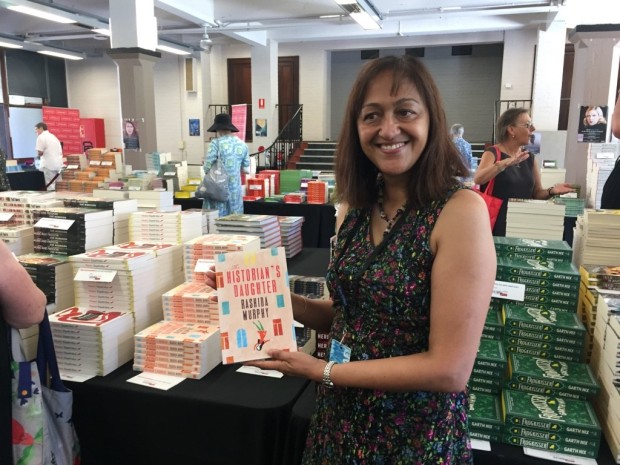 The first time I read the blurb for Rashida Murphy’s debut novel, The Historian’s Daughter (UWA Publishing), I knew this was a book I’d love:
The first time I read the blurb for Rashida Murphy’s debut novel, The Historian’s Daughter (UWA Publishing), I knew this was a book I’d love:
“In an old house with ‘too many windows and women’, high in the Indian hills, young Hannah lives with her older sister Gloria; her two older brothers; her mother — the Magician; a colourful assortment of aunts, blow-ins and misfits; and her father — the Historian…”
Little did I know that the woman who wrote these alluring lines would also be a gentle soul and a kindred spirit — a softly spoken individual, with a heart filled with compassion and kindness, and an unwavering commitment to inclusion, diversity and equality.
Written as part of a PhD, The Historian’s Daughter is one of those novels that gently lulls you with the beauty of its language and sentence structure, with a compelling plot, and characters who are at once completely original yet recognisable from personal experience. Underneath the beauty of the writing, though, is a haunting story of secrets, lies, jealousies, love, loss, family and, finally, a sense of hope and self recognition for protagonist Hannah. I cannot recommend it highly enough, particularly to readers who value writing that is precisely evocative, emotionally satisfying and thought-provoking.
As her website reveals, Rashida’s short fiction and poetry has been published in various international literary journals and anthologies, including the Westerly, Open Road Review, and Veils Halos and Shackles. In 2015, The Historian’s Daughter was shortlisted in the Scottish Dundee International Book Prize, and in 2016 Rashida was a guest editor at the Westerly and Books Editor at Cafe Dissensus.
Rashida has a Masters in English Literature and a PhD in Writing from Edith Cowan University. She has taught ESL (English as a Second Language) and worked as an education lecturer. In 2016 she was the joint winner of the Magdalena Prize for feminist research for her thesis, which includes The Historian’s Daughter. Rashida lives in Perth with her husband and “visiting wildlife”.
As you will see, Rashida’s responses to my Shelf Aware questions reflect her passion for quality literary fiction, her innate intelligence, her genuine warmth and a delightful wit. As a tale about mother-daughter relationships, The Historian’s Daughter would be a perfect Mother’s Day choice for those who appreciate a story that will enfold them in its portrayal of family life, with characters and a plot that will remain long after the final page is turned. Enjoy!
Q. Rashida, how would you describe the work you do and how you do it?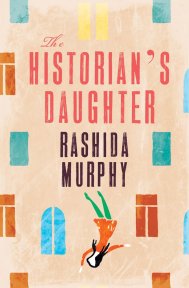
A. It’s taken me a while to own this reality – I’m a writer and I write. Badly on some days, occasionally well, and sometimes I even finish a whole piece – usually a story, poem or essay. Most of the pieces I’m happy about arrive whole, which means I write them in a single day, over a few hours. The ones that trouble me most are the stories that I think are great, only to have them rejected by a few journals. Then there are some that are almost but not quite there and I especially like these – they trouble me, haunt me and won’t leave me alone. That sounds masochistic, but I think anyone who writes must admit to a melancholy sort of masochism occasionally.
Q. What is your latest project and/or what do you have in the pipeline?
A. I’m working on my second novel, tentatively titled, Leaving Canterbury, and I’m not sure where it’s going at the moment. I’ve got about 25,000 words and I’m enjoying it in a way I didn’t enjoy The Historian’s Daughter. Trust a PhD to take the fun out of writing. I’m also working on essays and short stories and poems. I need to do this while I write a longer work. I noticed that when I was trying to ‘just’ write a novel. The most productive period for me seems to be when I ought to be writing The Great Indo-Australian Novel – stories and poems burst forth from the confines of my confused mind.
Q. Where are the main bookcases in your home or office? Do you also keep books in other places at home (or elsewhere)?
A. My books are everywhere, especially at the moment. We’ve moved homes from north to south, and my books are waiting for shelves.* Here’s a picture of my former bookshelf, built by my clever husband who actually just got tired of buying me bookshelves every year. It held over a thousand books. Sadly, I had to leave it behind.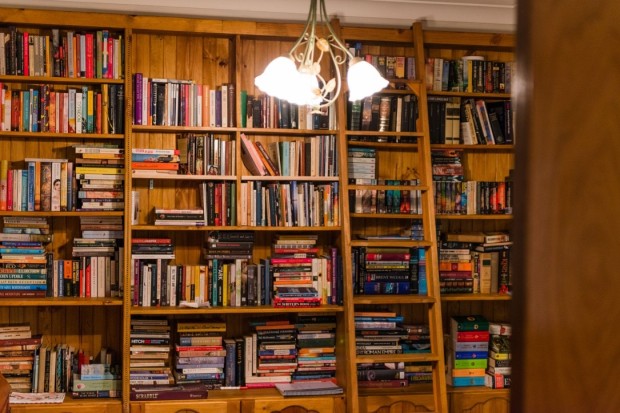
At the present time, most of my reference and beloved books are unpacked and stacked wherever I can find space. I have journals that I think I collect because they are beautiful, although I do occasionally use them. This is my current study.
Q. How are your books organised or arranged?
A. I arrange books by geography and gender. My largest collection is Australian and Indian women writers, followed by the men. I worried for a long time about putting the Irish next to the English but figured John Banville and James Joyce wouldn’t really mind sitting next to D.H. Lawrence and Thomas Hardy. Ditto with the Russians and Hungarians but Garcia Marquez seems to like Salman Rushdie, who likes William Dalrymple – you understand my confusion? Poetry has its own shelf and is not divided, so Sylvia Plath and Ted Hughes and Leonard Cohen cohabit comfortably alongside T.S. Eliot, Annamaria Weldon and Adrienne Rich.
Q. What sorts of books predominate?
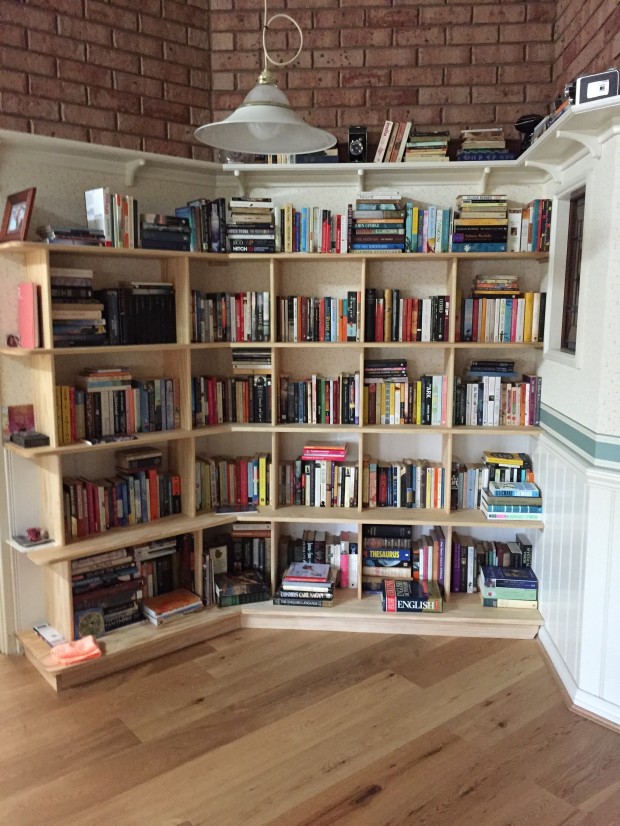
Book shelves at Rashida’s new home.
A. It’s an eclectic collection simply because I allow my husband’s books to live on some of my shelves. He reads science fiction and builds daleks in his spare time. Occasionally he sneaks one of his books into my collection just to see if I notice. I do. And evict the offending book promptly.
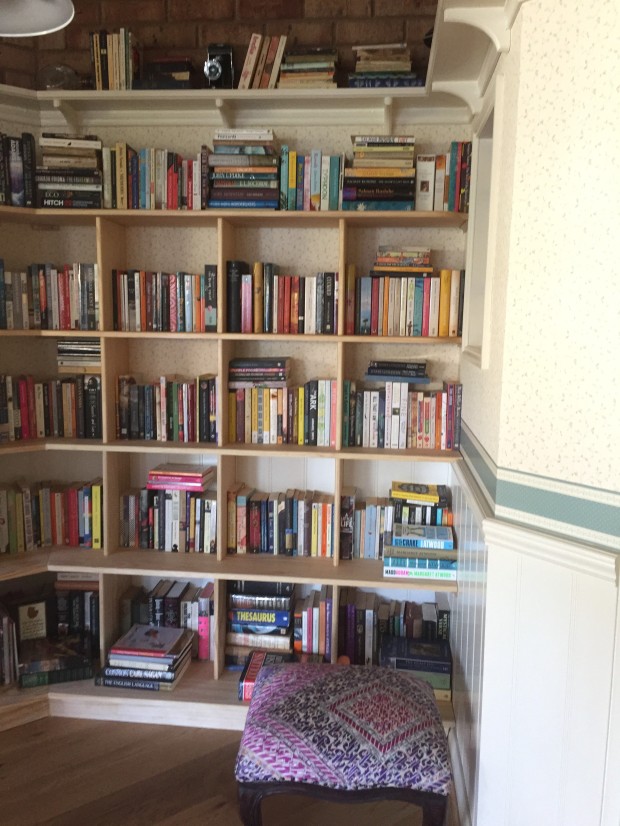
Literary fiction by women dominates my shelves, followed by poetry, history and reference books. I have a lot of books about books with fabulous titles like Trafficking In Old Books, Negotiating With The Dead, The Superior Person’s Book of Words and Eats, Shoots and Leaves. My daughter gave that last one to me and this is what she wrote inside: ‘To my mother, whom I hold responsible for my anally retentive habit of always noticing bad grammar, and assuming that the creator of bad grammar is ignorant. Also, I’m sure that my tendency to create glorious, nonsensical words originates in maternal mistreatment during childhood. Anyway, love you heaps.’ Naturally it’s all perfectly spelled, in neat writing, with commas included.
Q. Describe your favourite reading place.
A. I read everywhere, usually on the couch in the lounge, in my study, on the train, while waiting for someone. I have a book in the car, in my bag, on tables scattered throughout the house. I usually read several books at the same time, except when a book is so fierce it won’t leave me alone and I devote all my time to it.
Q. What books are your reading right now? Why did you choose those books and what do you think of them so far?
A. I’ve got a stash of books from the Perth Writers Festival that I hope to get into later this year. Currently I’m reading two books by Alberto Manguel, The Library at Night and A Reading Diary. I’m loving both. Manguel is a writer I pick up and put down and think about, so I’m also reading poetry by Susan Varga and Amanda Joy and intend to start reading Clementine Ford’s Fight Like a Girl and Madeleine Thein’s Do Not Say We Have Nothing. I have a 50-page rule with books. If it hasn’t gripped me in 50 pages, I leave it and start another. Sometimes I do go back and read it anyway and call it research. I sound like a grasshopper, I know, but really, I’m quite calm and almost human.
Q. What are your favourite books and/or who are your favourite authors?
A. This question would take me about an hour to answer in detail so I’ll stick with contemporary writers for the sake of brevity. I read everything by Kate Atkinson, Kamila Shamsie, Zadie Smith, Margaret Atwood, Salman Rushdie, Nadeem Aslam, William Dalrymple, Helen Garner and Amanda Curtin. That said, I much prefer Rushdie’s earlier works. Midnight’s Children still rates among my top 10 books of all time and The Enchantress of Florence was quite wonderful, unlike the much maligned and rather boring Satanic Verses.
Q. In the event of an emergency, if you could save just three books from your collection, which books would they be — and why would you choose them?
A. I’d prefer to go down with my books than leave them. However, I’d pick the first book my husband bought for me, Harry Potter and The Philosopher’s Stone, with the inscription, “For a little magic in your life”, and Far From the Madding Crowd, by Thomas Hardy, because I’m in love with Gabriel Oak. And I’m sure I’d find room for three others, Amanda Curtin’s Elemental, The Collected Poems of T.S.Eliot and The Douglas Adams Omnibus.
Q. If you could sit down for afternoon tea with your three favourite characters or authors, who would they be, what would you serve them, and what would you like to talk to them about?
A. I’d definitely sit down with Heathcliff from Wuthering Heights for a cuppa, although I imagine a stiff Scotch would probably serve him better. I’d ask him if he would consider me an adequate replacement for Catherine, then, if he said yes, get as far away from him and his moors, because, you know, he’s crazy. I’d love to sip tea with Hiroko Tanaka, who survives the Nagasaki bombings in Burnt Shadows. Kamila Shamsie’s exquisite book begins with this haunting sentence: “Later, the one who survives will remember the day as grey.” And finally I’d invite Jeanette Winterson on a quiet evening walk by the Swan River and chat to her about being happy and being normal and how her mother thought stories were dangerous.
Website:
https://rashidawritenow.wordpress.com/
#rashidamurphy #uwapublishing #thehistoriansdaughter #literaryfiction #australianauthors #australianwomenauthors
































I love this interview, Maureen. Rashida seems a delightful person with a gorgeous sense of humour.
LikeLiked by 2 people
She definitely is absolutely delightful, Nadia. I feel so honoured to have spent time with her on a number of occasions, and to have sat down with her at a book club, to talk about her sublime novel.
LikeLike
Thank you so much for this lovely interview and your generous and soul warming words. I cherish your kindness. It’s always a pleasure to speak with you (in person) and online.
LikeLiked by 1 person
Thank you so much, Rashida. I was so thrilled when you agreed to take part in the blog series, because I knew your responses to my questions would be entertaining, informative and inspirational — and they were all three of those things. Now all I have to do is find space for books by some of the authors you’ve mentioned…
LikeLiked by 1 person
Fabulous – I enjoyed reading this so much. 🙂
LikeLiked by 1 person
I’m so glad you enjoyed it. You can probably tell, I have a very high opinion of Rashida — and her writing.
LikeLiked by 1 person
I love this series, Maureen—the bookshelves make me salivate and each writer’s answers to your questions are unique and different. I do get shelf envy, though, especially in this case. I saw Rashida’s old house and the wall of book shelves in the flesh, so to speak, as did you, and they were even more glorious than the photo shows, don’t you think? I must say, I’m liking the look of her new shelves, too. 😉 Thank you, Maureen and Rashida.
LikeLiked by 3 people
I love the series, too, Louise. I know the idea was originally selfishly motivated, but I’m glad it also appeals to other people who love reading, writing and books. Rashida’s original bookshelves were beautiful, especially because they were made with love; and whoever moved into her old house was very fortunate indeed. I agree that the new shelves have a great deal of appeal — and they contain some amazing titles. More great guest authors to come soon!
LikeLiked by 2 people
Thank you, all you lovely people, for taking the time to read and comment. As Maureen knows, her questions came at exactly the right time for me, and I was glad to let a rather dark few weeks go, and concentrate with joy on talking books and shelves 🙂
LikeLike
A gorgeous post from one of my favourite people and a favourite writer too. Rashida’s shelves… works of art! Thanks, Rashida and Maureen (and I’m honoured beyond measure to be on lists like these) 🙂
LikeLiked by 2 people
Your name thoroughly deserves to be on lists of favourite authors and books… Glad you enjoyed Rashida’s guest post. She has rapidly become one of my favourite people, too!
LikeLiked by 1 person
I absolutely loved the inscription Rashida’s daughter wrote in the book she gifted to her – writing obviously runs in the family.
And so many books and shelves! Yet again I have serious shelf envy, but in the most positive way. It’s inspiring to see so many books in someone’s home.
LikeLiked by 1 person
I loved the reason why Rashida’s husband gave her a copy of the first Harry Potter novel. How delightful that he wanted to add a little magic to her life… I’ve been re-reading the first HP novels since I received Rashida’s guest post, and I’m thoroughly enjoying myself.
LikeLiked by 1 person